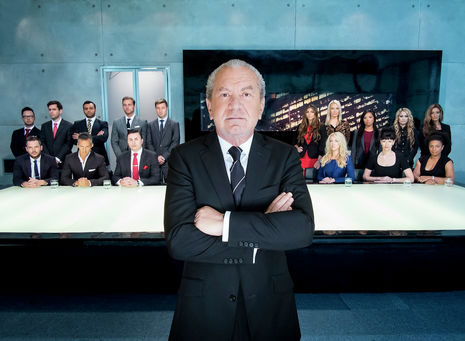The Love-Island-ification of The Apprentice
When did all reality television shows become beauty pageants?

Seventeen seasons is an old and wrinkled age in TV years, and the creators of The Apprentice seem desperate for the show to feel young again. Much like a midlife-crisis induced Jaguar purchase, however, the result feels like a letdown for both entertainment and inclusivity: indeed, it seems its producers have decided the only way to keep their show fresh and attractive is to make the candidates just that.
In 2005, the only thing the contestants in ill-fitting suits and somewhat awkward grey skirts had in common was their desperation to work with Lord Sugar. Skip forward to today, and it appears there are more stringent requirements to be among the lucky few fighting for his mentorship.
“The show’s blatant preference for looks over entrepreneurial spirit is problematic”
In what has been described as the Love-Island-ification of The Apprentice, the vast majority of its contestants are now young, very attractive and already boast social media followings. With all but three of this year’s contestants being under 35, we have to ask ourselves where the age diversity has gone. No one would ever want to watch a TV show with homogeneous casting based on race, ethnicity or gender – and for good reason – so why is it blindly accepted when it comes to age? Why should a show with cross-generational appeal like The Apprentice exclusively cast contestants from one narrow age group?
For a show that was traditionally good at promoting age inclusivity precisely by demonstrating how success can come at different stages of life, this shift has been more than a little frustrating. When questioned about the lack of older contestants on the show, Lord Sugar reiterated: “There is no age limit to our applications”. Nonetheless, the fetishisation of reaching career milestones as young as possible is overpowering the importance of highlighting individuals succeeding thanks to, and not in spite of, their wealth of professional and life experience.
This bias is at the very heart of television’s ageism problem. According to research by the Centre for Ageing Better, only three in ten believe that TV and film show older people to be full of potential with the same amount believing it makes being 50+ seem depressing and with limited opportunities.
Age is not the only factor at play: this new iteration of The Apprentice has a broader, more sinister obsession with appearance. Thomas Skinner, a contestant in 2019, has said that the producers made the hopeful auditionees arrange themselves in order from “prettiest to ugliest”; when did The Apprentice become a beauty pageant? Amy Anzel, a contestant on last year’s show branded it a “wannabe Love Island” as “A lot of the female candidates are quite beautiful and it was interesting that the first episode was on a beach” joking that “I’m surprised they weren’t in bikinis, but it is the BBC.”
“The most intelligent candidates are never selected for the show, because audiences couldn’t keep up”
In what Lorraine Candy called the unwelcome return of the “1980s Boardroom Barbie”, women’s business attire now looks far closer to the misogynistic ideal male bosses dreamed up decades ago than ever since. This isn’t to undermine women who feel at home “power dressing” in stiletto heels and hourglass bodycon dresses – it is simply to question the notion that this should serve as a mandatory uniform for female Apprentice contestants and women in business in general.
The series has also faced allegations that producers intentionally shy away from platforming smart contestants, instead promoting ditzy and uninformed, stereotype-bound characters – especially women. Former show aide Nick Hewer has levelled that the most intelligent candidates are never selected for the show, because audiences couldn’t keep up, and that producers tried to prevent a contestant from being fired because she was blond and “thick as a fridge door”.
Of course, there is no escaping that television is a visual medium and being intelligent and attractive are certainly not mutually exclusive. However, the show’s blatant preference for looks over entrepreneurial spirit is problematic for what purports to be a “serious business reality show”. On a show which should judge candidates first and foremost on the basis of their business competency, the choice of ageism and lookism as selection criteria is worryingly outdated.
These issues are wider than their display on the set of The Apprentice. Despite being one of the most pervasive forms of bias, "pretty privilege" is hardly ever acknowledged nor engaged with on serious terms. And yet, studies routinely demonstrate that attractive people are more likely to be interviewed for jobs, hired, promoted and even earn 10–15% higher wages than their less conventionally attractive counterparts.
The Apprentice’s producers believe they are trading inclusivity for the easy rating gains of the young and beautiful. They could not be more wrong. Setting such stringent preconditions for achieving reality TV success could potentially narrow the target audience of the show and alienate viewers seeking relatable personalities.
 News / Eight Cambridge researchers awarded €17m in ERC research grants27 December 2025
News / Eight Cambridge researchers awarded €17m in ERC research grants27 December 2025 News / Downing investigates ‘mysterious’ underground burial vault 29 December 2025
News / Downing investigates ‘mysterious’ underground burial vault 29 December 2025 Lifestyle / Ask Auntie Alice29 December 2025
Lifestyle / Ask Auntie Alice29 December 2025 Sport / Hard work, heartbreak and hope: international gymnast Maddie Marshall’s journey 29 December 2025
Sport / Hard work, heartbreak and hope: international gymnast Maddie Marshall’s journey 29 December 2025 Interviews / Meet Juan Michel, Cambridge’s multilingual musician29 December 2025
Interviews / Meet Juan Michel, Cambridge’s multilingual musician29 December 2025









